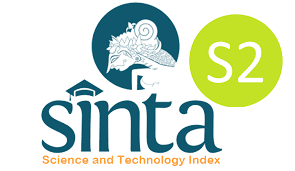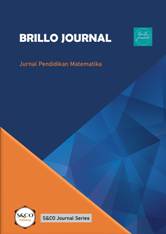The Development of Student Worksheet Based on Problem Based Learning Approach on Matrices Topics
DOI:
https://doi.org/10.56773/bj.v2i1.23Keywords:
Matrices, Problem based learning, Research and development, Student worksheetAbstract
This study aims to develop Problem Based Learning (PBL)-based worksheets to improve student’s critical thinking skills in contextual problem solving. The research design used is a feasibility analysis by research and development methods. The research was carried out using research and development (R&D) research and development methods. The sample consisted of 40 students from science programs in 11th grade. The data collection instrument used is the expert assessment sheet, student responses to the created worksheet. The development procedure with 8 stages namely potentials and problems, information gathering, product design, expert validation, first revision, product trial, second revision, final product. From the results obtained the average feasibility value by the media is 81.46% (very feasible), the average graphic feasibility value is 81.85% included in the very feasible criteria, the language eligibility average value is 76% included in the appropriate criteria and the average value of student responses is (87.40%) (very positive).
References
Arikunto, S. (2013). Prosedur Penelitian suatu Pendekatan Praktik [A Practical Approach Research Procedure]. Rineka Cipta
Ramury, F., Gustina, G., & Putri, A. D. (2020). Pengembangan Lembar Kerja Siswa Berbasis Problem Based Learning (PBL) pada Materi Penerapan Barisan dan Deret [Development of Problem Based Learning (PBL) Based Students' Worksheets on the Application of Sequences and Series Material]. Jurnal Pendidikan Matematika RAFA, 6(1), 85-99. https://doi.org/10.19109/jpmrafa.v6i1.5890
Eriyani, E., Sholihah, I, Askar, R. A., Obina, W. M., Andika, A., Wahab, A., Suryaningsih, S., & Teddywono, I., …, & Faridah, E. (2022). Menggagas Reformasi Pendidikan Nasional Menuju Kemandirian dan Kemajuan Bertaraf Global [Initiating National Education Reform Towards Global Level Independence and Progress]. Global Aksara Pers.
Glasnovic-Gracin, D. (2018). Requirements in mathematics textbooks: a five-dimensional analysis of textbook exercises and examples. International journal of mathematical education in science and technology, 49(7), 1003-1024. https://doi.org/10.1080/0020739X.2018.1431849
Kristin, N., Ditasona, C., & Lumbantoruan, J. H. (2021). Kemampuan Berpikir Kritis Matematis Siswa: Studi dengan Model Probing-Prompting dan Konvensional [Students' Mathematical Critical Thinking Ability: A Study by Probing-Prompting and Conventional Models]. Brillo Journal, 1(1), 20-28. https://doi.org/10.56773/bj.v1i1.7
Maryani, N., & Widjajanti, D. B. (2020). Mathematical literacy: How to improve it using contextual teaching and learning method?. Journal of Physics: Conference Series, 1581(1), 012044. https://doi.org/10.1088/1742-6596/1581/1/012044
Nugroho, A. A., Putra, R. W. Y., Putra, F. G., & Syazali, M. (2017). Pengembangan blog sebagai media pembelajaran matematika [Development of a blog as a medium for learning mathematics]. Al-Jabar: Jurnal Pendidikan Matematika, 8(2), 197-203. https://doi.org/10.24042/ajpm.v8i2.2028
Sari, A., & Ditasona, C. (2019). Developing Mathematics Module based on Realistic Mathematics Education (RME): Triangle Topic for 7 th grade of Junior High School. In Proceedings of the 1st International Conference on Science and Technology for an Internet of Things, 20 October 2018, Yogyakarta, Indonesia. https://doi.org/10.4108/eai.19-10-2018.2281303
Wahyuni, R., Efuansyah, E., & Sukasno, S. (2020). Developing student worksheet based on missouri mathematics project model by using think-talk-write strategy of class VIII. Infinity Journal, 9(1), 81-92. https://doi.org/10.22460/infinity.v9i1.p81-92
Yulianti, D., Rusilowati, A., & Nugroho, S. E. (2020). Student worksheets based on Science, Technology, Engineering and Mathematics (STEM) to facilitate the development of critical and creative thinking skills. Journal of Physics: Conference Series, 1567(2), 022068.
Downloads
Published
How to Cite
Issue
Section
License
Copyright (c) 2022 Brillo Journal

This work is licensed under a Creative Commons Attribution 4.0 International License.
The authors agree that this article remains permanently open access under the terms of the Creative Commons Attribution 4.0 International License






